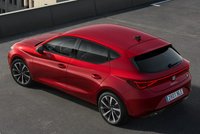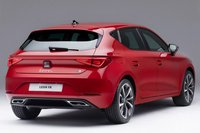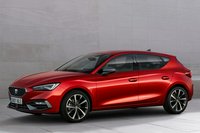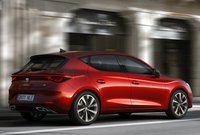SEAT Leon 4
Compact HatchbackProduct Gallery







Product Overview
SEAT Leon Mk4 is an affordable compact hatchback in production from 2020. It is available with a range of inline-3 and inline-4 that displaced 1.0 to 2.0 liters.
Compared to the Mk3 Leon, the Mk4 is more "normal"-looking, which is a giant improvement, as VW clearly considers SEAT the disposable sub-brand. Still, the Leon is the poor cousin of the VW Golf.
The official fuel economy rating is exceptionally rosy, though it may cast more doubts on the trustworthiness of the regulators and perhaps the owner's own sanity than it relates to reality.
Ratings
What we found
Neofiliac score 17%
Pros
- Low official fuel consumption
- Less ugly than before
Cons
- Poorly built
- Only available with small engines
- No independent rear suspensions
What external reviewers found
External score 65%
Pros
- Superb infotainment system
- Good range
- Superb electric power
- Decent infotainment
Cons
- Lack of practicality
- Only two driving modes
- Small boot
- Not fun to drive on the move
- No three-door option
- Slightly more expensive than the Mk3
Your rating:
12345678910
?/10
Price Comparison
As associates of the merchants above, we earn a commission when you make a purchase using the supplied links.
Specifications
Variants shown:
1.0 eTSI DSG
1.0 TSI 110
1.0 TSI 90
1.4 e-HYBRID DSG
1.5 eTSI DSG
1.5 TGI
1.5 TGI DSG
1.5 TSI 130
1.5 TSI 150
2.0 TDI 115
2.0 TDI 150 DSG
2.0 TSI DSG
[[{"Ft":"Capacity","Fn":"Cargo Capacity","Fv":"380 L / 13.4 cu-ft ~ 1301 L / 45.9 cu-ft"},{"Ft":"Capacity","Fn":"Coolant Capacity","Fv":"8.0 L / 8.5 qt"},{"Ft":"Capacity","Fn":"Engine Oil Capacity","Fv":"4.0 L / 4.2 qt"},{"Ft":"Capacity","Fn":"Fuel Capacity","Fv":"45.0 L / 11.9 gal"},{"Ft":"Capacity","Fn":"Passengers","Fv":"5"},{"Ft":"Capacity","Fn":"Payload","Fv":"605 kg / 1334 lbs"},{"Ft":"Chassis","Fn":"Brakes | Front","Fv":"Ventilated discs, 288x25 mm"},{"Ft":"Chassis","Fn":"Brakes | Rear","Fv":"Disc, 272x10 mm"},{"Ft":"Chassis","Fn":"Power Steering","Fv":"Electric Steering"},{"Ft":"Chassis","Fn":"Suspension | Front","Fv":"MacPherson strut"},{"Ft":"Chassis","Fn":"Suspension | Rear","Fv":"Semi-independent, Torsion beam"},{"Ft":"Chassis","Fn":"Tire Size","Fv":"205/50 R17 93V, 225/40 R18 92Y"},{"Ft":"Chassis","Fn":"Turning Circle","Fv":"10.5 m / 34.4 ft"},{"Ft":"Construction","Fn":"Battery | Capacity","Fv":"12.8 kWh (gross)"},{"Ft":"Construction","Fn":"Body Style","Fv":"5-door mild-hybrid Hatchback"},{"Ft":"Dimensions","Fn":"Size | Height","Fv":"1442 mm / 56.8 in"},{"Ft":"Dimensions","Fn":"Size | Length","Fv":"4368 mm / 172.0 in"},{"Ft":"Dimensions","Fn":"Size | Width","Fv":"1800 mm / 70.9 in | 1991 mm / 78.4 in (mirror unfolded)"},{"Ft":"Dimensions","Fn":"Track Width | Front","Fv":"1534.0 mm / 60.4 in"},{"Ft":"Dimensions","Fn":"Track Width | Rear","Fv":"1516.0 mm / 59.7 in"},{"Ft":"Dimensions","Fn":"Weight","Fv":"1255.0 kg / 2766.8 lbs"},{"Ft":"Dimensions","Fn":"Wheel Size","Fv":"7.5J x 17 ET46, 7.5J x 18 ET46"},{"Ft":"Dimensions","Fn":"Wheelbase","Fv":"2686 mm / 105.7 in"},{"Ft":"Performance","Fn":"Acceleration | 0 - 100 km/h","Fv":"10.8 sec"},{"Ft":"Performance","Fn":"Acceleration | 0 - 60 mph","Fv":"10.3 sec"},{"Ft":"Performance","Fn":"CO2 Emission","Fv":"102 g/km"},{"Ft":"Performance","Fn":"Electric Range","Fv":"58.0 km / 36.0 mi"},{"Ft":"Performance","Fn":"Fuel Economy","Fv":"4.5 L/100km / 52.3 MPG (combined) | 5.2 L/100km / 45.2 MPG (urban) | 4.1 L/100km / 57.4 MPG (highway)"},{"Ft":"Performance","Fn":"Top Speed","Fv":"192.0 km/h / 119.3 mph"},{"Ft":"Performance","Fn":"Towing Capacity","Fv":"630 kg / 1389 lbs (w/o brakes) | 1300 kg / 2866 lbs (w/ brakes @ 12% gradient)"},{"Ft":"Powertrain","Fn":"Drivetrain Layout","Fv":"Front-engine (transverse), Front-wheel drive"},{"Ft":"Powertrain","Fn":"Emission Standard","Fv":"Euro 6 AP"},{"Ft":"Powertrain","Fn":"Engine","Fv":"DLA"},{"Ft":"Powertrain","Fn":"Engine | Bore","Fv":"74.5 mm / 2.9 in"},{"Ft":"Powertrain","Fn":"Engine | Compression Ratio","Fv":"11.5:1"},{"Ft":"Powertrain","Fn":"Engine | Displacement","Fv":"1.0 L / 61.0 cu-in / 999.0 cc"},{"Ft":"Powertrain","Fn":"Engine | Power","Fv":"110.0 hp / 82.0 kW @ 5500 rpm"},{"Ft":"Powertrain","Fn":"Engine | Specific Output","Fv":"110.1 hp/L / 1.8 hp/cu-in"},{"Ft":"Powertrain","Fn":"Engine | Stroke","Fv":"76.4 mm / 3.0 in"},{"Ft":"Powertrain","Fn":"Engine | Torque","Fv":"200 Nm / 147.5 lb-ft @ 2000-3000 rpm"},{"Ft":"Powertrain","Fn":"Engine | Type","Fv":"Turbocharged direct-injected petrol inline-3 engine with 4 values per cylinder"},{"Ft":"Powertrain","Fn":"Transmission | Gears","Fv":"7-speed"},{"Ft":"Powertrain","Fn":"Transmission | Type","Fv":"Automatic DSG"},{"Ft":"Production","Fn":"Availability","Fv":"2021"}],[{"Ft":"Capacity","Fn":"Cargo Capacity","Fv":"380 L / 13.4 cu-ft ~ 1301 L / 45.9 cu-ft"},{"Ft":"Capacity","Fn":"Coolant Capacity","Fv":"8.0 L / 8.5 qt"},{"Ft":"Capacity","Fn":"Engine Oil Capacity","Fv":"4.0 L / 4.2 qt"},{"Ft":"Capacity","Fn":"Fuel Capacity","Fv":"45.0 L / 11.9 gal"},{"Ft":"Capacity","Fn":"Passengers","Fv":"5"},{"Ft":"Capacity","Fn":"Payload","Fv":"546 kg / 1204 lbs"},{"Ft":"Chassis","Fn":"Brakes | Front","Fv":"Ventilated discs"},{"Ft":"Chassis","Fn":"Brakes | Rear","Fv":"Disc"},{"Ft":"Chassis","Fn":"Power Steering","Fv":"Electric Steering"},{"Ft":"Chassis","Fn":"Suspension | Front","Fv":"MacPherson strut"},{"Ft":"Chassis","Fn":"Suspension | Rear","Fv":"Semi-independent, Torsion beam"},{"Ft":"Chassis","Fn":"Tire Size","Fv":"195/65 R15 ET45"},{"Ft":"Chassis","Fn":"Turning Circle","Fv":"10.5 m / 34.4 ft"},{"Ft":"Construction","Fn":"Battery | Capacity","Fv":"12.8 kWh (gross)"},{"Ft":"Construction","Fn":"Body Style","Fv":"5-door Hatchback"},{"Ft":"Dimensions","Fn":"Size | Height","Fv":"1456 mm / 57.3 in"},{"Ft":"Dimensions","Fn":"Size | Length","Fv":"4368 mm / 172.0 in"},{"Ft":"Dimensions","Fn":"Size | Width","Fv":"1800 mm / 70.9 in | 1991 mm / 78.4 in (mirror unfolded)"},{"Ft":"Dimensions","Fn":"Track Width | Front","Fv":"1534.0 mm / 60.4 in"},{"Ft":"Dimensions","Fn":"Track Width | Rear","Fv":"1516.0 mm / 59.7 in"},{"Ft":"Dimensions","Fn":"Weight","Fv":"1204.0 kg / 2654.4 lbs"},{"Ft":"Dimensions","Fn":"Wheel Size","Fv":"15 in"},{"Ft":"Dimensions","Fn":"Wheelbase","Fv":"2685 mm / 105.7 in"},{"Ft":"Performance","Fn":"Acceleration | 0 - 100 km/h","Fv":"10.9 sec"},{"Ft":"Performance","Fn":"Acceleration | 0 - 60 mph","Fv":"10.4 sec"},{"Ft":"Performance","Fn":"CO2 Emission","Fv":"107 g/km"},{"Ft":"Performance","Fn":"Electric Range","Fv":"58.0 km / 36.0 mi"},{"Ft":"Performance","Fn":"Fuel Economy","Fv":"4.7 L/100km / 50.0 MPG (combined) | 5.7 L/100km / 41.3 MPG (urban) | 4.1 L/100km / 57.4 MPG (highway)"},{"Ft":"Performance","Fn":"Top Speed","Fv":"197.0 km/h / 122.4 mph"},{"Ft":"Performance","Fn":"Towing Capacity","Fv":"630 kg / 1389 lbs (w/o brakes) | 1300 kg / 2866 lbs (w/ brakes @ 12% gradient)"},{"Ft":"Powertrain","Fn":"Drivetrain Layout","Fv":"Front-engine (transverse), Front-wheel drive"},{"Ft":"Powertrain","Fn":"Emission Standard","Fv":"EURO 6 AP"},{"Ft":"Powertrain","Fn":"Engine","Fv":"DLAA"},{"Ft":"Powertrain","Fn":"Engine | Bore","Fv":"74.5 mm / 2.9 in"},{"Ft":"Powertrain","Fn":"Engine | Compression Ratio","Fv":"11.5:1"},{"Ft":"Powertrain","Fn":"Engine | Displacement","Fv":"1.0 L / 61.0 cu-in / 999.0 cc"},{"Ft":"Powertrain","Fn":"Engine | Power","Fv":"110.0 hp / 82.0 kW @ 5500 rpm"},{"Ft":"Powertrain","Fn":"Engine | Specific Output","Fv":"110.1 hp/L / 1.8 hp/cu-in"},{"Ft":"Powertrain","Fn":"Engine | Stroke","Fv":"76.4 mm / 3.0 in"},{"Ft":"Powertrain","Fn":"Engine | Torque","Fv":"200 Nm / 147.5 lb-ft @ 2000-3000 rpm"},{"Ft":"Powertrain","Fn":"Engine | Type","Fv":"Turbocharged direct-injected petrol inline- engine"},{"Ft":"Powertrain","Fn":"Transmission | Gears","Fv":"6-speed"},{"Ft":"Powertrain","Fn":"Transmission | Type","Fv":"Manual"},{"Ft":"Production","Fn":"Availability","Fv":"2020"}],[{"Ft":"Capacity","Fn":"Cargo Capacity","Fv":"380 L / 13.4 cu-ft ~ 1301 L / 45.9 cu-ft"},{"Ft":"Capacity","Fn":"Coolant Capacity","Fv":"10.0 L / 10.6 qt"},{"Ft":"Capacity","Fn":"Engine Oil Capacity","Fv":"4.0 L / 4.2 qt"},{"Ft":"Capacity","Fn":"Fuel Capacity","Fv":"45.0 L / 11.9 gal"},{"Ft":"Capacity","Fn":"Passengers","Fv":"5"},{"Ft":"Capacity","Fn":"Payload","Fv":"550 kg / 1213 lbs"},{"Ft":"Chassis","Fn":"Brakes | Front","Fv":"Ventilated discs"},{"Ft":"Chassis","Fn":"Brakes | Rear","Fv":"Disc"},{"Ft":"Chassis","Fn":"Power Steering","Fv":"Electric Steering"},{"Ft":"Chassis","Fn":"Suspension | Front","Fv":"MacPherson strut"},{"Ft":"Chassis","Fn":"Suspension | Rear","Fv":"Semi-independent, Torsion beam"},{"Ft":"Chassis","Fn":"Tire Size","Fv":"195/65 R15 ET45"},{"Ft":"Chassis","Fn":"Turning Circle","Fv":"10.5 m / 34.4 ft"},{"Ft":"Construction","Fn":"Battery | Capacity","Fv":"12.8 kWh (gross)"},{"Ft":"Construction","Fn":"Body Style","Fv":"5-door Hatchback"},{"Ft":"Dimensions","Fn":"Size | Height","Fv":"1456 mm / 57.3 in"},{"Ft":"Dimensions","Fn":"Size | Length","Fv":"4368 mm / 172.0 in"},{"Ft":"Dimensions","Fn":"Size | Width","Fv":"1800 mm / 70.9 in | 1991 mm / 78.4 in (mirror unfolded)"},{"Ft":"Dimensions","Fn":"Track Width | Front","Fv":"1534.0 mm / 60.4 in"},{"Ft":"Dimensions","Fn":"Track Width | Rear","Fv":"1516.0 mm / 59.7 in"},{"Ft":"Dimensions","Fn":"Weight","Fv":"1200.0 kg / 2645.5 lbs"},{"Ft":"Dimensions","Fn":"Wheel Size","Fv":"15 in"},{"Ft":"Dimensions","Fn":"Wheelbase","Fv":"2685 mm / 105.7 in"},{"Ft":"Performance","Fn":"Acceleration | 0 - 100 km/h","Fv":"12.7 sec"},{"Ft":"Performance","Fn":"Acceleration | 0 - 60 mph","Fv":"12.1 sec"},{"Ft":"Performance","Fn":"CO2 Emission","Fv":"106 g/km"},{"Ft":"Performance","Fn":"Electric Range","Fv":"58.0 km / 36.0 mi"},{"Ft":"Performance","Fn":"Fuel Economy","Fv":"4.6 L/100km / 51.1 MPG (combined) | 5.5 L/100km / 42.8 MPG (urban) | 4.1 L/100km / 57.4 MPG (highway)"},{"Ft":"Performance","Fn":"Top Speed","Fv":"183.0 km/h / 113.7 mph"},{"Ft":"Performance","Fn":"Towing Capacity","Fv":"630 kg / 1389 lbs (w/o brakes) | 1100 kg / 2425 lbs (w/ brakes @ 12% gradient)"},{"Ft":"Powertrain","Fn":"Drivetrain Layout","Fv":"Front-engine (transverse), Front-wheel drive"},{"Ft":"Powertrain","Fn":"Emission Standard","Fv":"EURO 6 AP"},{"Ft":"Powertrain","Fn":"Engine","Fv":"DLAB"},{"Ft":"Powertrain","Fn":"Engine | Bore","Fv":"74.5 mm / 2.9 in"},{"Ft":"Powertrain","Fn":"Engine | Compression Ratio","Fv":"11.5:1"},{"Ft":"Powertrain","Fn":"Engine | Displacement","Fv":"1.0 L / 61.0 cu-in / 999.0 cc"},{"Ft":"Powertrain","Fn":"Engine | Power","Fv":"90.0 hp / 67.1 kW @ 5500 rpm"},{"Ft":"Powertrain","Fn":"Engine | Specific Output","Fv":"90.1 hp/L / 1.5 hp/cu-in"},{"Ft":"Powertrain","Fn":"Engine | Stroke","Fv":"76.4 mm / 3.0 in"},{"Ft":"Powertrain","Fn":"Engine | Torque","Fv":"175 Nm / 129.1 lb-ft @ 1500-4000 rpm"},{"Ft":"Powertrain","Fn":"Engine | Type","Fv":"Turbocharged direct-injected petrol inline- engine"},{"Ft":"Powertrain","Fn":"Transmission | Gears","Fv":"5-speed"},{"Ft":"Powertrain","Fn":"Transmission | Type","Fv":"Manual"},{"Ft":"Production","Fn":"Availability","Fv":"2020"}]]
External Reviews
autocar[1]
Reviewer score 64% (normalized by Neofiliac)The Leon family hatchback has long been Seat’s biggest seller. Sporty FR trim is now the starting point for the e-Hybrid model. It receives selectable drive modes and sports suspension as well as in-cabin niceties like wireless phone charging, heated door mirrors and a leather-wrapped, flat-bottomed steering wheel.
Pros
- Powerful petrol engine
- Comfortable to drive
- Decent infotainment system
Cons
- Pricier than rivals
autoexpress[2]
Reviewer score 71% (normalized by Neofiliac)The Leon has been a cornerstone of the SEAT range since 1999, when it replaced the Mk2 VW Golf-based Toledo. Since then, SEAT has shifted 2.2 million Leons globally, including around 250,000 in the UK. The Mk4 Leon is the most advanced and safest version to date. It's based on the same platform as the VW Golf, which means it's also closely related to the Audi A3 and Skoda Octavia.
Pros
- Cheap to drive
- Lots of standard equipment
Cons
- Small boot
- No three-door option
carmagazine[3]
Reviewer score 77% (normalized by Neofiliac)Seat's new 10.25-inch digital driver binnacle is simple to use and displays a seemingly endless amount of information. Infotainment screen will have many frothing at the mouth due to its lack of physical buttons. Boot size is 270 litres, some 110 litres less than non-plug-in hybrid Leon. The FR spec car on test here retails at more than £30,000.
Pros
- Superb electric power
- Superb infotainment system
Cons
- No manual gearbox
- Only two driving modes
Also Check
References
<
>
x